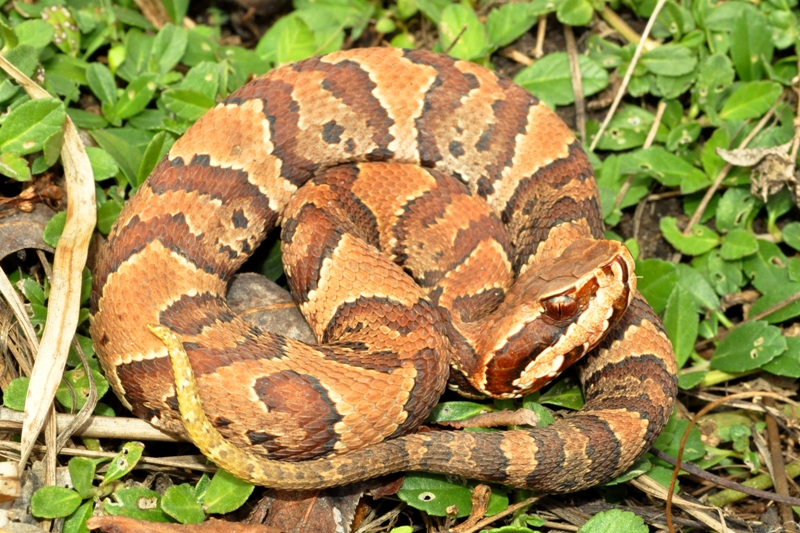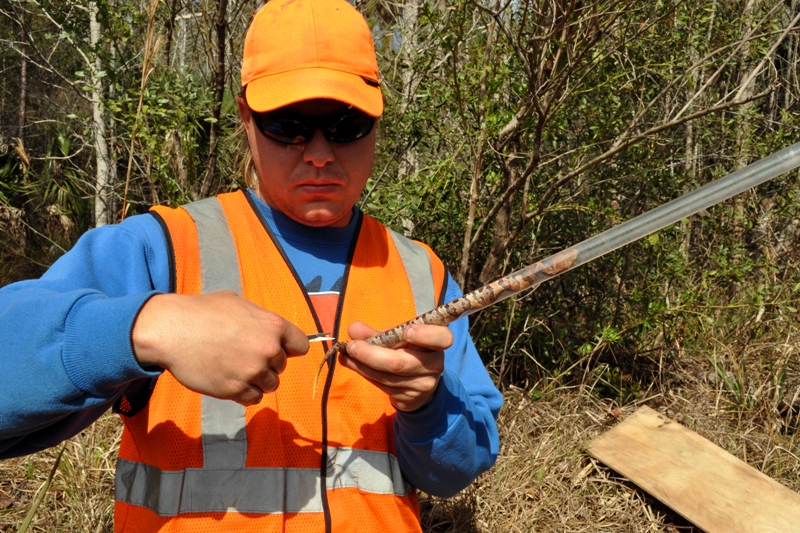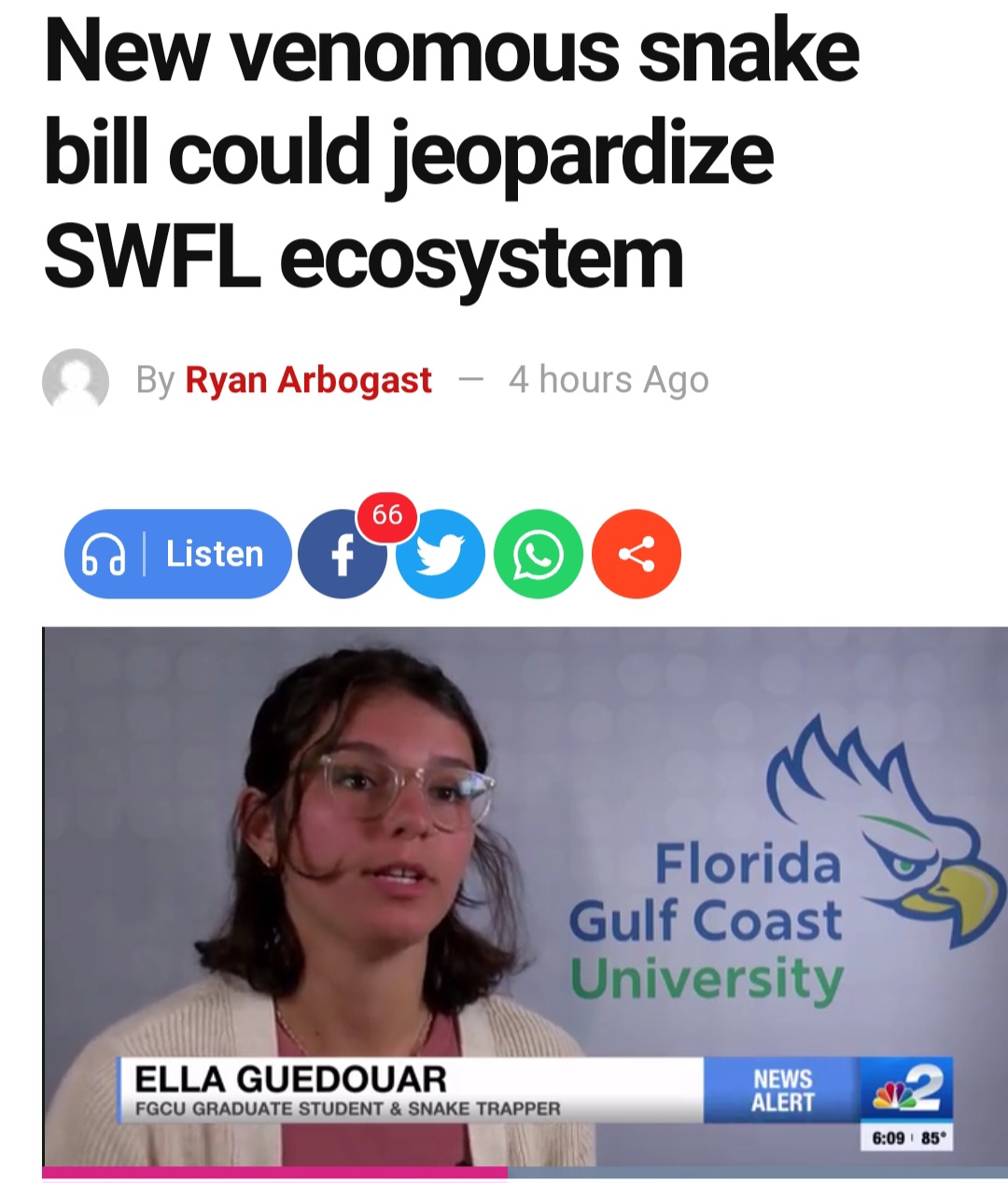Venomous Reptiles Bill Amended to Exclude Native Species
Conservation advocates had expressed concern over far-reaching impacts, believe additional action still necessary

Above: This juvenile Florida Cottonmouth was captured, tagged, and released as part of a UCF research project. (Photo by Daniel Parker)
Animal welfare advocates, scientists, nuisance wildlife trappers, and snake enthusiasts are pleased with an amendment that exempts native venomous snake species from the Venomous Reptiles bill moving through the Florida legislature. The original language of the bill would have made it a felony to release live, native venomous snakes for research, conservation, or humane relocation purposes.
The sponsor of HB1161, Representative Shane Abbott (R), reported to a representative of the United States Association of Reptile Keepers Florida (USARK FL) that he amended the bill after receiving a flurry of phone calls from concerned citizens late last week. Florida Fish and Wildlife Conservation Commission (FWC) staff present at the hearing also said that they were in favor of the amendment. Daniel Parker, currently an Environmental Scientist for DRMP and Director of Media for USARK FL said, “I am very pleased with Representative Abbott’s amendment. His response to public outcry proves that government can effectively work with stakeholders to improve the conservation value of legislation. FWC’s involvement on this is also very encouraging.”
Stakeholders from Florida Gulf Coast University, University of Central Florida, Sanibel-Captiva Conservation Foundation, Ashton Biodiversity Research and Preservation Institute, The Rattlesnake Conservancy, Bear Warriors United, and USARK FL raised concerns on the original language of the bill.

Above: Daniel Parker captured, tagged, and released this juvenile Florida cottonmouth as part of research project for UCF. (Photo by Adam Casavant)
FWC drafted the text for HB1161 and the accompanying Senate version SB1266 and has lobbied their progress under the pretext of preventing the illegal sale and release of venomous reptiles, especially nonnative species. However, the broad wording of the original text of the bill also imposed felony penalties for the release of native venomous snakes, with no exceptions for research or humane relocation. The amended version of the bill will apply only to nonnative venomous reptile species. Release of nonnative venomous snakes is already illegal under current FWC rules. This bill will increase penalties. Under the provisions of this bill, a violation will be punishable by up to five years prison, five years probation, and a $5,000 fine.

Above: Florida Gulf Coast University graduate student Ella Guedouar appeared on NBC2 to discuss the bill before the amendment exempting native species was madel. See NBC2/ABC7 story here: https://abc--7-com.cdn.ampproject.org/v/s/abc-7.com/news/science/2023/03/23/new-venomous-snake-bill-could-jeopardize-swfl-ecosystem/amp/?amp_gsa=1&_js_v=a9
Native venomous snakes are frequently captured and released in scientific research projects. “We capture snakes,” said FGCU graduate student and member of the “snake team,” Ella Guedouar, speaking to NBC News 2. Guedouar catches and releases native venomous snakes to keep them from being killed by home owners. “A lot of time, we get calls from the community members around FGCU – there might be snakes in the yard. We capture the snake, take measurements of it, and then release it in an area where it might be safe from people, and people will be safe from them.”
Venomous License holders must adhere to strict facility standards, such as maintaining a Florida Building Commission data plate documenting the structural soundness of the facility. They must maintain locked and sealed rooms and build a double entrance to provide secondary containment in the case of an escape. These requirements are enforced by regular FWC inspections. Though these strict facility requirements may be helpful in preventing escapes of captive nonnative snakes, they are not applicable to instances of native snakes being relocated. Stakeholders have asked FWC to consider separate licensing requirements for relocators.
Above: Screenshot from FWC’s website giving their interpretation that nuisance wildlife trappers who do not have FWC’s Venomous Reptiles license may kill venomous snakes, but may not relocate them alive. (https://myfwc.com/license/captive-wildlife/faq/)
Tony Daly-Crews of The Rattlesnake Conservancy released this statement:
We are happy to see the State Legislature moving in the right direction for Florida's wildlife. However, a longstanding position of Florida Fish and Wildlife Conservation Commission is to the detriment of our native venomous reptiles - such as the eastern diamondback rattlesnake, a species being considered for listing under the Federal Endangered Species Act. Nuisance wildlife trappers that often respond to venomous and non-venomous snakes in people's backyards are required to have a state permit to possess venomous reptiles in order to legally relocate a snake; this permit has onerous requirements and under 5% of nuisance wildlife trappers in the state have it. Instead, the position of FWCC is that if a nuisance wildlife trapper does not have a permit to possess venomous reptiles, the trapper's only options are to either kill the animal on-site or leave the homeowner to fend for themselves; both options generally result in death of our native wildlife.
Parker also believes that other facets of venomous snake research, rescue, and relocation still need to be addressed. “Now that the conservation of Florida’s snakes has the public’s attention, this would be an ideal time to discuss the legal requirements for live capture, transport, and release of native venomous snakes." Parker continued. “FWC’s venomous rules were written with the intent to regulate those who keep venomous snakes in captivity at a physical facility. They discourage qualified people who have no interest in keeping snakes in captivity, but would humanely relocate native snakes if the licensing requirements were more reasonable. FWC’s current policy actually encourages people to kill venomous snakes, which also puts people at risk because they are sometimes bitten while trying to kill the snakes.”
USARK FL President Elizabeth Wisneski said, “This amendment is a good thing for native venomous snakes.” She added, “We are still looking for clear definitions on terms like ‘gross negligence’ and how they apply to reptile keepers. The language of the bill needs to be very clear. We are concerned about how broad interpretation by law enforcement could cause hardship for people in our industry, as it has on other issues. We will continue to communicate our concerns to our elected representatives.”
View the bills at these links:
For additional photos or information on this topic, or to schedule an interview, please call Daniel Parker, Director of Media for USARK FL at 863-441-5067 or email media@usarkfl.net. Media outlets are given permission by Daniel Parker and Adam Casavant to print the photos contained in this press release.